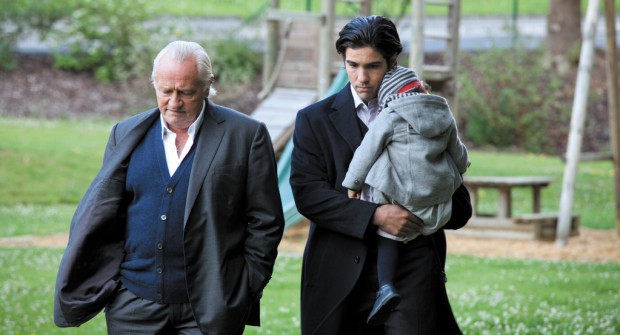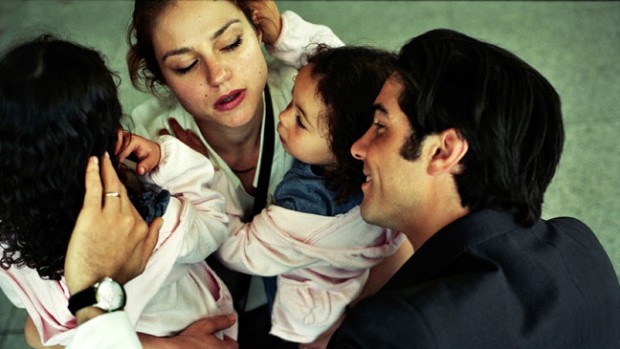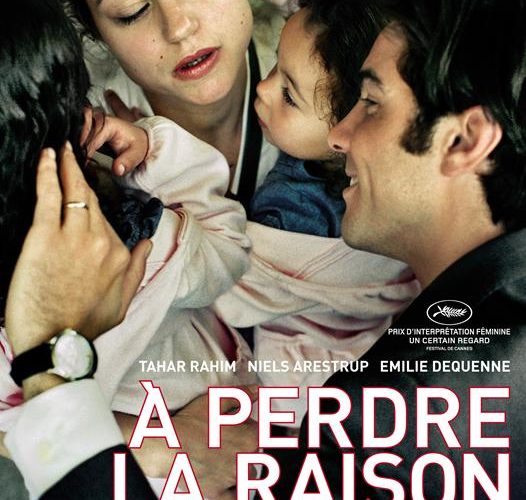Opening a film with ending of a story is a daring move that requires much confidence on the filmmaker’s part. Billy Wilder’s Sunset Boulevard is the rare animal that pulls it off swimmingly. A lesser film risks losing the viewers’ interest quickly with such a big giveaway. Films with famous stories do it out of necessity; James Cameron wisely used the history to frame his melodrama since we all know what happened to the real Titanic. Similarly, director Joachim Lafosse made no attempt to hide the tragic ending of Our Children, which begins with a close-up of the bedridden Murielle (Émilie Dequenne) telling hospital staff of her wish to have her children buried in Morocco. Then it cuts to an embrace between an older man and a shellshock fellow, whom the audience can presume is the father of the children. The harrowing prologue ends with a wide shot of four caskets being moved onto a plane.

Inspired by a news story he heard on the radio, the Belgian filmmaker is ostensibly more interested in what led to this horrific crime than the crime itself. The resulting film is an autopsy of a marriage, or more specifically, a family unit. The story begins with two young people madly in love, as we are reintroduced to a slightly younger version of the couple making love passionately. On their ride back to town, Mounir, played by Tahir Rahim, tells Murielle giddily that he wishes to marry her. She is a vivacious schoolteacher. He is a young Moroccan immigrant who work lives and work for a doctor named André (Niels Arestrup). The film eschews the route of clearly defining Mounir and Andé’s relationship and instead let the pair’s dynamic unfolds bit by bit as the story goes on. Yet for fans of francophone cinema, seeing Rahim and Arestrup sharing the screen will definitely recall memories of Jacques Audiard’s 2009 hit A Prophet, which also features the two actors playing characters with inextricable ties. André, who brought Mounir to Europe when he was a child and had a sham marriage with his sister for her immigration papers, has a huge clout over his young protégé. Every gesture in the beginning seems to be done in good faith—he invites Murielle to live in his house after learning the lovebirds’ plans to take a further step in their relationship and in turn they innocently invited him to their honeymoon, which is one of the many first red flags seems strange to any onlooker. Viewers will soon realize his attachment to Mounir strongly suggests a homoerotic undercurrent, making this triangular relationship all the more complicated.
Even as their family grows and prospers, the couple continues to live with André, who asserts his financial and emotional hold on the husband while the wife is slowly suffocated by her lack of freedom and control over her family. Her only solace comes from her rare meetings with Mounir’s mother from Morocco, who in spite of language and cultural barriers, makes her feel like part of a family. Ironically, living in close quarters with her husband, children and André only contributes to her feeling scapegoated and excluded.

Although it appears as a domestic drama, colonialism is an unequivocal force in Our Children and the metaphor cannot be any more obvious— an old Frenchman plays benefactor to a young Moroccan who has the illusion that he’s in charge of his own family when clearly he is too afraid to make any decision that can potentially risk his current middle-class lifestyle. As the number of babies begins to multiply, the film becomes a bit repetitive—a necessary evil to build up Murielle’s domestic malaise. The greatest strength of this character-driven drama is the trio of performances and Dequenne’s turn as Murielle is the most impressive. The young actress, whom I can barely recognize from her breakthrough debut in the Dardenne brothers’ 1999 film Rosetta, gives the audience a clear trajectory of a young teacher who is full of life to an exhausted woman on the verge of a nervous breakdown. If there is more than a familiar face that reminds you of the Dardennes, that could be because cinematographer Jean-François Hensgens was the first assistant camera in a few of the Belgian siblings’ early films. Though Lafosse has shown considerable craft here, much of Our Children remains in the shadow of A Prophet and The Dardenne brothers.
Our Children premiered at Cannes Film Festival, recently screened at 37th Hong Kong International Film Festival, and is awaiting U.S. distribution.

